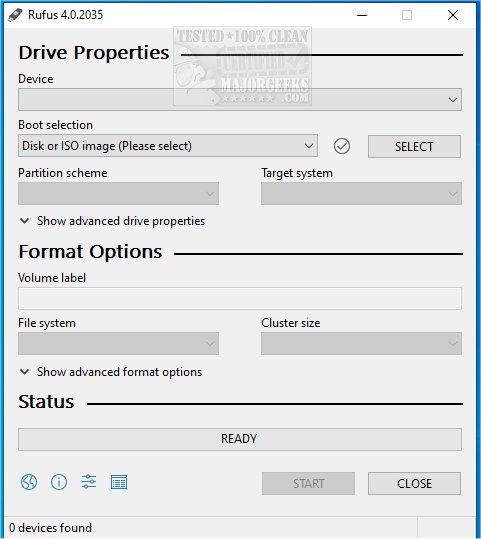Rufus 4.10 Beta / 4.9 has been released, enhancing its capabilities as a powerful Open Source utility for quickly formatting and creating bootable USB flash drives. This tool is particularly useful for tasks such as installing operating systems, running diagnostics, and flashing firmware. One of the standout features of the latest release is its integration with Fido, which allows users to download Windows 10 and 8.1 ISOs directly from Microsoft servers, streamlining the process further.
Rufus is designed to be user-friendly and efficient, making it a preferred choice for many users. It supports a variety of file formats and is compatible with both BIOS and UEFI systems, ensuring versatility across different hardware configurations. The utility is portable, lightweight, and does not require installation, allowing it to run instantly.
The scenarios in which Rufus excels include creating bootable installation drives for Windows or Linux, generating rescue disks for system recovery, and flashing firmware updates. It is particularly beneficial for IT professionals and tech support teams for troubleshooting and maintaining systems. However, it is worth noting that Rufus is optimized for single operating systems on individual USB drives. For users needing to install multiple OSs on one USB, alternatives like Ventoy may be more suitable.
Rufus is packed with additional features that enhance its functionality, such as support for various ISO files, persistent storage for Linux users, advanced partitioning options, and a Secure Boot and TPM bypass feature for installing Windows 11 on unsupported hardware. It also includes automatic bad block detection and low-level formatting capabilities, making it a reliable tool for power users.
Users should be aware that using Rufus will erase existing data on the USB drive, so backing up important files beforehand is essential. It is also Windows-only, meaning Mac users must seek out different tools like BalenaEtcher. Some ISOs might require extra steps for proper configuration, and selecting the right partition scheme is crucial for compatibility with the system.
In summary, Rufus stands out as one of the best tools for creating bootable USB drives due to its speed, efficiency, and feature-rich design. It is highly recommended for anyone involved in operating system installations or system recovery tasks. For those looking to streamline their bootable USB creation process, downloading Rufus is a wise choice.
As technology evolves, users can expect Rufus to continue adapting, potentially incorporating even more features and compatibility options in future updates, making it an essential tool for both casual users and IT professionals alike
Rufus is designed to be user-friendly and efficient, making it a preferred choice for many users. It supports a variety of file formats and is compatible with both BIOS and UEFI systems, ensuring versatility across different hardware configurations. The utility is portable, lightweight, and does not require installation, allowing it to run instantly.
The scenarios in which Rufus excels include creating bootable installation drives for Windows or Linux, generating rescue disks for system recovery, and flashing firmware updates. It is particularly beneficial for IT professionals and tech support teams for troubleshooting and maintaining systems. However, it is worth noting that Rufus is optimized for single operating systems on individual USB drives. For users needing to install multiple OSs on one USB, alternatives like Ventoy may be more suitable.
Rufus is packed with additional features that enhance its functionality, such as support for various ISO files, persistent storage for Linux users, advanced partitioning options, and a Secure Boot and TPM bypass feature for installing Windows 11 on unsupported hardware. It also includes automatic bad block detection and low-level formatting capabilities, making it a reliable tool for power users.
Users should be aware that using Rufus will erase existing data on the USB drive, so backing up important files beforehand is essential. It is also Windows-only, meaning Mac users must seek out different tools like BalenaEtcher. Some ISOs might require extra steps for proper configuration, and selecting the right partition scheme is crucial for compatibility with the system.
In summary, Rufus stands out as one of the best tools for creating bootable USB drives due to its speed, efficiency, and feature-rich design. It is highly recommended for anyone involved in operating system installations or system recovery tasks. For those looking to streamline their bootable USB creation process, downloading Rufus is a wise choice.
As technology evolves, users can expect Rufus to continue adapting, potentially incorporating even more features and compatibility options in future updates, making it an essential tool for both casual users and IT professionals alike
Rufus 4.10 Beta / 4.9 released
Rufus is a small Open Source utility that helps quickly format and creates bootable USB flash drives, such as USB keys/pen drives, memory sticks, etc. Rufus is now integrated with Fido to download Windows 10 and 8.1 ISOs from Microsoft servers. Video guide available.


